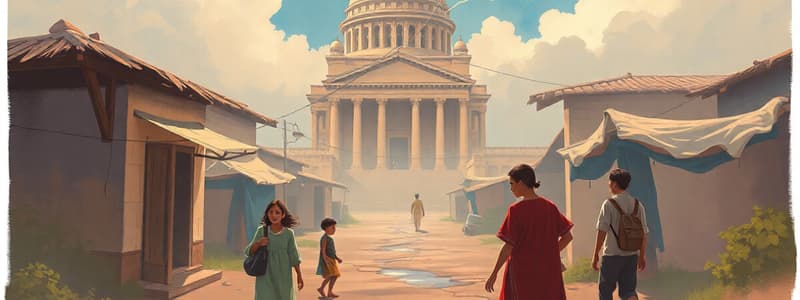Podcast
Questions and Answers
Classical theories suggest that individuals have no control over their financial destiny.
Classical theories suggest that individuals have no control over their financial destiny.
False (B)
Neoclassical theories recognize factors beyond individual control that contribute to poverty.
Neoclassical theories recognize factors beyond individual control that contribute to poverty.
True (A)
The concept of 'sub-cultures of poverty' suggests that deficiencies can persist over time due to the absence of role models.
The concept of 'sub-cultures of poverty' suggests that deficiencies can persist over time due to the absence of role models.
True (A)
Keynesian/neoliberal theories dismiss the impact of government functions on poverty alleviation.
Keynesian/neoliberal theories dismiss the impact of government functions on poverty alleviation.
Critics of classical and neoclassical approaches argue that they neglect the community context of poverty.
Critics of classical and neoclassical approaches argue that they neglect the community context of poverty.
Climate change is estimated to push more than 200 million people into poverty over the next ten years.
Climate change is estimated to push more than 200 million people into poverty over the next ten years.
A lack of infrastructure can prevent access to basic services, thus limiting opportunities for families living in rural areas.
A lack of infrastructure can prevent access to basic services, thus limiting opportunities for families living in rural areas.
Governments with limited capacity can effectively support all citizens in times of crisis through social welfare programs.
Governments with limited capacity can effectively support all citizens in times of crisis through social welfare programs.
People living in poverty often have sufficient reserves to cope with unexpected events such as illness or natural disasters.
People living in poverty often have sufficient reserves to cope with unexpected events such as illness or natural disasters.
Natural disasters like droughts push individuals further into poverty by depleting their already limited resources.
Natural disasters like droughts push individuals further into poverty by depleting their already limited resources.
Flashcards are hidden until you start studying
Study Notes
What is Poverty?
-
Poverty is the state of lacking the financial and essential resources for basic human needs.
-
Poverty is a condition in which people's income from work is too low to meet their basic human needs.
Theories of Poverty
- Classical and neoclassical Theories:
- Individuals are responsible for their own destiny.
- They choose to become poor through choices like forming single-parent families.
- The concept of "sub-cultures of poverty" suggests that deficiencies are passed down, like a lack of role models.
- State aid should focus on changing individuals' capabilities and attitudes.
- Neoclassical Theories:
- Recognize reasons for poverty beyond individuals' control.
- Including lack of social and private assets, market failures, barriers to education, immigrant status, poor health, advanced age, and barriers to employment for single-parent families.
- Keynesian/neoliberal Theories:
- Focus on the government's role in poverty reduction.
- Emphasize the importance of public goods and income distribution.
- Believe overall growth of income is the most effective method.
- Climate Change:
- The World Bank estimates climate change will push over 100 million people into poverty in the next ten years.
- Climate events disproportionately impact the poorest communities.
- This is because many rely on agriculture and are vulnerable to natural disasters such as droughts and floods, pushing them further into poverty.
- Lack of Infrastructure:
- Lack of infrastructure, like roads, bridges, and wells, isolates rural communities, limiting their access to education, employment, and markets.
- Limited Capacity of Government:
- Weak governments cannot provide the necessary social welfare programs or infrastructure for its citizens.
- This leads to further vulnerability to poverty and lack of security.
- Lack of Reserves:
- People living in poverty lack the means to cope with life's challenges, like droughts, conflicts, or illnesses.
- Crime:
- Lack of economic opportunity can lead to crime.
- High unemployment (192 million people are jobless) is a global issue, particularly in poorer countries.
- Unemployment is a major factor for high crime rates, especially among youth.
- Lack of Education:
- A direct correlation exists between low academic performance and poverty.
- Children in poverty face difficulties with cognitive development and management of stress, resulting in behavioural challenges.
- Poverty restricts access to education, with many children forced to work instead of attending school.
- Lack of resources in schools also contributes to poor education quality.
Initiatives to Combat Poverty
- S&T Innovations for the Base of the Pyramid in Southeast Asia (iBoP Asia):
- Promotes "base of the pyramid" (BoP) and science and technology (S&T) approaches to poverty alleviation.
- The BoP refers to roughly 4 billion people living on less than US$4 a day.
- Gawad Kalinga Builders’ Institute (GKBI):
- Builds capacity for Gawad Kalinga (GK) staff, volunteers, and partners.
- Developed training programs and materials for poverty alleviation.
- Child and Family Development Program (CFDP):
- Works with communities in Manila to address children's intellectual, physical, psychosocial, emotional, and spiritual needs.
- Assessing Local Government Capacity to Manage Natural Disaster Risks in the Philippines:
- Supports local government units in reducing their vulnerability to natural disasters and improving their access to financing for risk mitigation and post-disaster recovery.
- Service Delivery Assessment 2 – Plan-to-Budget Link:
- Helps harmonize planning, programming, budgeting, monitoring, and evaluation in local government units.
- Regulatory Simplification Project:
- Works with city governments to showcase the positive results of business regulation reform, aiming to increase economic activity and reduce transaction costs.
Studying That Suits You
Use AI to generate personalized quizzes and flashcards to suit your learning preferences.




